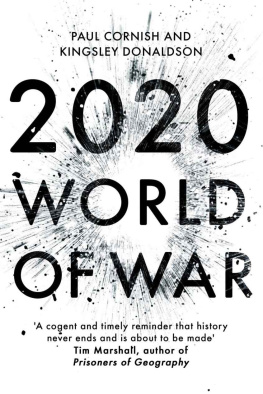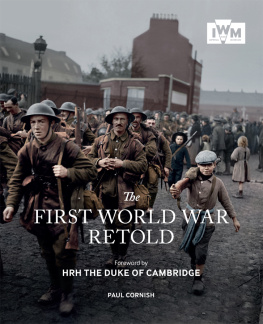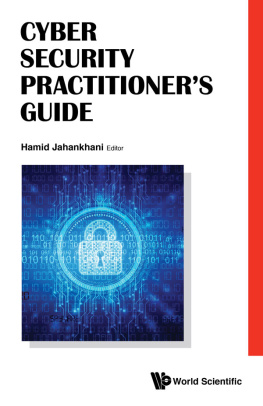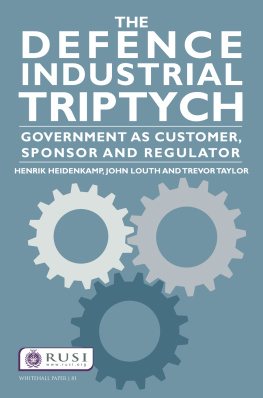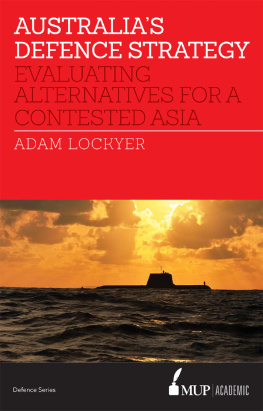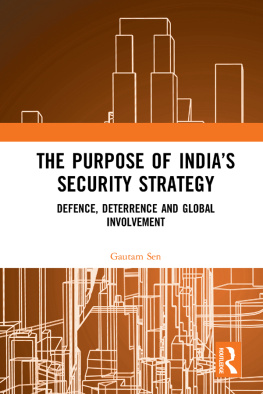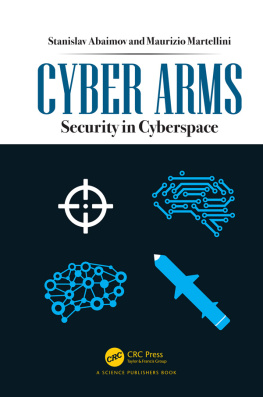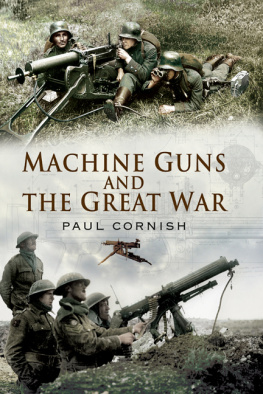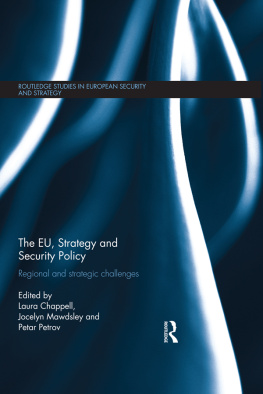About the Authors
Paul Cornish
Paul Cornish was educated at the University of St Andrews and the London School of Economics. He then served in the British Army (Royal Tank Regiment) and the Foreign and Commonwealth Office before completing his PhD in strategic history at the University of Cambridge. He is Chief Strategist at Cityforum Public Policy Analysis and Visiting Professor at the National Security College, Australian National University.
Kingsley Donaldson
KINGSLEY DONALDSON is a retired Army officer. He has served on operations in a number of European and Middle Eastern countries in various roles that span from countering weapons of mass destruction through to negotiating with armed groups in Iraq. His last appointments at the Ministry of Defence were concerned with national defence and security strategy. He now advises a number of governments in his role as Director of the Causeway Institute for Peace-building Conflict Resolution International.

www.hodder.co.uk
First published in Great Britain in 2017 by Hodder and Stoughton
An Hachette UK company
Copyright Paul Cornish and Kingsley Donaldson 2017
The right of Paul Cornish and Kingsley Donaldson to be identified as the Authors of the Work has been asserted by them in accordance with the Copyright, Designs and Patents Act 1988.
All rights reserved.
No part of this publication may be reproduced, stored in a retrieval system, or transmitted, in any form or by any means without the prior written permission of the publisher, nor be otherwise circulated in any form of binding or cover other than that in which it is published and without a similar condition being imposed on the subsequent purchaser.
A CIP catalogue record for this title is available from the British Library
ISBN 978 1 473 64034 4
Hodder & Stoughton Ltd
Carmelite House
50 Victoria Embankment
London EC4Y 0DZ
www.hodder.co.uk
For Fiona, Emily, Archie, Charlie and Duncan.
Paul Cornish
To Helen for her love and support throughout and to those friends and colleagues who never came home. We have our tomorrow because they gave their today.
Kingsley Donaldson
To the memory of General Sir John Hackett GCB, CBE, DSO and Bar, MC, DL, BLitt, MA, LLD
Soldier and Scholar
Contents
AUTHORS NOTE AND ACKNOWLEDGEMENTS
We who have put this book together know very well that the only forecast that can be made with any confidence of the course and outcome of another world war, should there be one, is that nothing will happen exactly as we have shown here.
These are the words with which General Sir John Hackett and his co-authors concluded The Third World War, August1985: A Future History. Having set out to write an adaptation of Hacketts imaginative and provocative book, one more suited to the security challenges of the present day, we have all along sought to emulate Hacketts caution regarding strategic prediction and over-confident futurology.
If events could turn out as described here, then that is reason enough to ask whether that possibility has been contemplated seriously and whether preparations have been made. Where security, defence and national strategy are concerned, what is not acceptable is to abandon thought, analysis and preparation until the future reveals itself.
Where we differ from Hacketts approach is that we do not contemplate the possibility of another world war or any other form of global cataclysm. Instead, 2020: World of War depicts twenty-first-century international security as a complex of interwoven pressures, challenges, hazards and threats.
In the course of this project, we have drawn upon countless conversations, discussions, seminars and conferences in the UK, Europe, the United States and elsewhere around the world. Our friends and colleagues in government, the armed forces, research institutes, universities and the media are all owed our thanks. These discussions informed the selection of topics and scenarios that form the core of this book. 2020: World of War was conceived and delivered as a collaborative effort and these scenarios could not have been written without expert contributions from the following:
Professor Kerry Brown: Professor of Chinese Studies and Director of the Lau China Institute, Kings College, London; Associate Fellow, Chatham House, London.
Mr Anthony Cornish: author and editor, Longmead Publishing.
Professor Christopher Donnelly CMG: Director, Institute for Statecraft, London.
Professor Julian Lindley-French: Vice-President of the Atlantic Treaty Association, Distinguished Visiting Research Fellow of the National Defense University in Washington DC, and a Fellow of the Canadian Global Affairs Institute.
Dr Rajiv Nayan: Senior Research Associate, Institute for Defence Studies and Analyses, Delhi.
Ms Prabha Rao: Senior Fellow, Institute for Defence Studies and Analyses, Delhi.
Mr Nathan Ryan: Defence and Security Analyst, RAND Europe, Cambridge.
Dr Uttam Kumar Sinha: Fellow, Institute for Defence Studies and Analyses, Delhi; Distinguished Fellow, Institute for National Security Studies, Sri Lanka.
Professor Gareth Stansfield: Al-Qasimi Chair of Arab Gulf Studies and Professor of Middle East Politics, University of Exeter.
Following the example set by Hackett and his fellow authors, no contributions to 2020: World of War are signed since strict attribution would not be easy in so cooperative an enterprise.
Our final word of thanks must go to Rupert Lancaster, our publisher at Hodder & Stoughton and to Barry Johnston for his meticulous and patient editorial guidance.
Paul Cornish & Kingsley Donaldson
March 2017
INTRODUCTION
Our world rapidly worsens.
Nothing now is so horrid
Or silly it cant occur
W. H. Auden, 1972
Cold War Strategy
With the Cold War at its height, 1978 saw the publication of The Third World War, August1985: A Future History by General Sir John Hackett and others. The Third World War was a work of fiction centred upon a scenario in which the armed forces of the Soviet Union and the Warsaw Pact launched a major offensive into NATOs Central Region, crossing the Inner German Border separating the Federal Republic of Germany (West Germany) from its estranged close relative the German Democratic Republic (East Germany). The uneasy stability of the Cold War collapsed into full-scale conflict as both sides committed their land, air and maritime forces to the struggle for Europe.
Sir John Hackett was a highly decorated veteran of the Second World War, who had fought in the SyriaLebanon campaign and in North Africa, where he was awarded the Distinguished Service Order. Having begun his career as an armoured soldier, Hackett was only thirty-three when he commanded the 4th Parachute Brigade in Operation Market Garden, the unsuccessful attempt in September 1944 to capture vitally important bridges across the Maas and the Rhine. Badly injured in the operation, Hackett was awarded a second DSO for his service at Arnhem. After the war, Hackett rose to command both the British Army of the Rhine and NATOs Northern Army Group, before retiring from the British Army in the late 1960s.
Hackett was subsequently to become the epitome of the modern soldier-scholar. A graduate of Oxford University, he was fluent in many languages and a noted author and lecturer in military history and strategic analysis. He concluded his academic career as Principal of Kings College London from 1968 to 1975. Known for the sharpness of his intellect as much as his physical courage, Hackett was a man of trenchant opinions concerning national strategy and defence. In 1968, while controversially still a very senior serving officer, Hackett wrote a letter to

